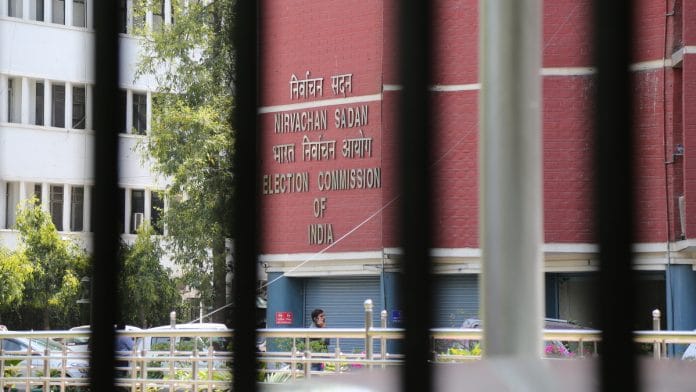New Delhi: The total number of registered political parties in India has climbed up to more than 2,500, and there are many more applications pending with the Election Commission of India, sources in the panel told ThePrint.
At the end of 2019, the numbers stood at seven national parties, 64 state parties and over 2,500 registered unrecognised parties.
Asked if the reason for this glut of new parties was the Narendra Modi government’s controversial electoral bonds scheme, EC sources refused to comment. An electoral bond is like a promissory note for political parties and can be issued in multiples of Rs 1,000, Rs 10,000, Rs 1 lakh, Rs 10 lakh and Rs 1 crore. The bond does not bear the name of the donor.
Asked about the possibility that some of these parties could be money-laundering operations, sources did not rule it out.
“It seems there is no let-up in the enthusiasm to set up political parties. A vast majority of these parties will never contest elections, or may use their status to turn black money into white,” said a senior EC functionary who didn’t want to be identified.
The EC, in December 2016, had delisted almost 300 political parties which, it was sure, existed only on paper and could be fronts to launder money. The official reason given was that these parties were “dormant” and had not contested any election since 2005.
After this round of delisting, the number had gone down from 1,786 to under 1,500 — in January 2017, there were seven national parties, 58 state parties and 1,400-odd registered unrecognised parties.
Also read: Modi govt is obsessed with exercising power instead of focusing on what matters — economy
Massive surge in 2018 and 2019
EC data shows that only 37 new parties were registered between January and November 2017, after the previous year’s purge. But the number of parties rose significantly to 2,069 by 20 June 2018 and 2,143 by 15 October that year.
By 15 March 2019, the number of registered unrecognised parties rose to 2,301. Between 1 April and 19 August 2019, India got 93 new parties, some of whose names are: Supreme Zero Party of Bharat, Ambedkar Sena Party, Indian National Youth Party, Varanasi-based Bahadur Aadmi Party, Sarita Vihar (Delhi)-based India Greens Party, Beed (Maharashtra)-based Tipu Sultan Party, Party of United Indians, and Professional Party of India (based in Najafgarh, New Delhi).
Another 20 names were added between 25 September and 5 November 2019.
No power to deregister
“We are aware of the rising numbers but there’s little we can do. We can only delist the inactive parties, which we did in 2016. But despite repeatedly asking the Centre, we still have not been granted power to deregister political parties,” the EC functionary quoted above said, explaining that delisting merely implies that the parties won’t receive tax exemption.
“Sometimes, we flag names of suspect parties to the Income Tax Department for investigation, but we don’t have the resources to keep tab of what the IT Department does.”
In February 2018, the EC, in an affidavit filed in the Supreme Court, had said even though it had been “writing to the central government for last 20 years to consider amending the act and give the commission the appropriate authority to de-register parties”, nothing had happened.
Also read: EC had flagged concerns over electoral bonds to Modi govt after Lok Sabha elections too







Black money and political parties. Only some? Not all. Come on! You are naive. Political parties are founded for parking black money.